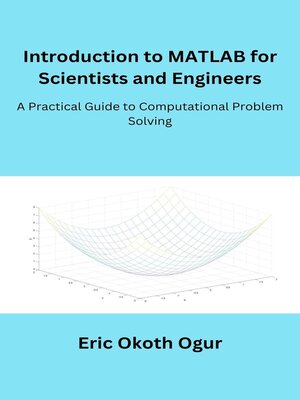Introduction to MATLAB for Scientists and Engineers
ebook ∣ A Practical Guide to Computational Problem Solving
By Eric Okoth Ogur

Sign up to save your library
With an OverDrive account, you can save your favorite libraries for at-a-glance information about availability. Find out more about OverDrive accounts.
Find this title in Libby, the library reading app by OverDrive.



Search for a digital library with this title
Title found at these libraries:
| Library Name | Distance |
|---|---|
| Loading... |
Introduction to MATLAB for Scientists and Engineers: A Practical Guide to Computational Problem Solving is a comprehensive, hands-on textbook designed to introduce students, researchers, and professionals to the power and flexibility of MATLAB as a computational tool. Authored by Professor Eric Okoth Ogur, a seasoned engineer and educator, this book bridges theoretical knowledge and practical application through clear explanations, real-world examples, and engaging exercises.
Written with clarity and pedagogical precision, the book starts with foundational concepts—introducing the MATLAB environment, basic commands, and core programming principles—before progressing into more advanced topics such as data visualization, numerical methods, control flow, symbolic mathematics, and case studies drawn from science and engineering disciplines.
Unlike traditional programming manuals that overwhelm with syntax, this book adopts a learner-friendly, example-driven approach. It guides readers step-by-step through problem-solving techniques relevant to modern science and engineering, enabling them to model physical systems, analyze data, develop algorithms, and visualize results effectively. Whether you're calculating the trajectory of a projectile, analyzing electrical circuits, plotting mathematical functions, or simulating a control system, each chapter provides contextual applications that bring theory to life.
Key Features:
Ideal for undergraduate students in STEM disciplines, early-stage graduate students, and professionals seeking a refresher or new skillset, this book also doubles as an invaluable resource for educators designing MATLAB-focused courses. Additionally, it supports project-based learning, making it ideal for institutions promoting hands-on, computational education.
Whether used in the classroom, laboratory, or self-study, Introduction to MATLAB for Scientists and Engineers offers a practical, inspiring, and empowering journey into the world of computational problem solving. It invites learners not only to use MATLAB—but to think with it.







